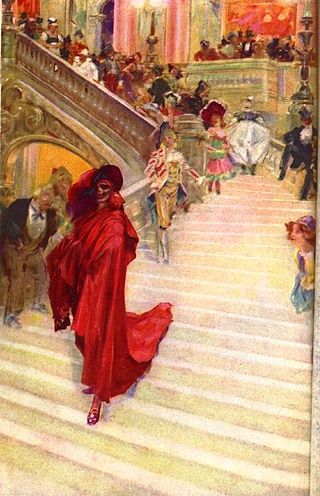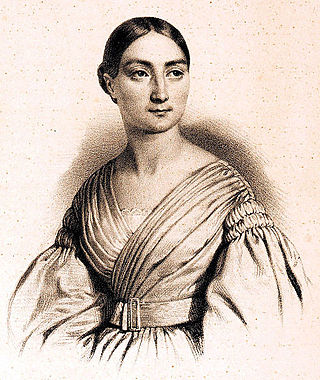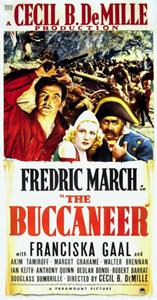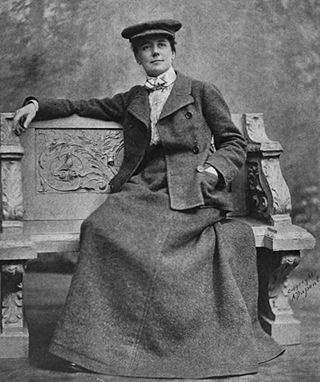
The Phantom of the Opera is a novel by the French author Gaston Leroux. It was first serialised in Le Gaulois from 23 September 1909 to 8 January 1910, and was released in volume form in late March 1910 by Pierre Lafitte. The novel is partly inspired by historical events at the Paris Opera during the nineteenth century, and by an apocryphal tale concerning the use of a former ballet pupil's skeleton in Carl Maria von Weber's 1841 production of Der Freischütz. It has been successfully adapted into various stage and film adaptations, most notable of which are the 1925 film depiction featuring Lon Chaney, and Andrew Lloyd Webber's 1986 musical.

La Cenerentola, ossia La bontà in trionfo is an operatic dramma giocoso in two acts by Gioachino Rossini. The libretto was written by Jacopo Ferretti, based on the libretti written by Charles-Guillaume Étienne for the opera Cendrillon with music by Nicolas Isouard and by Francesco Fiorini for Agatina, o la virtù premiata with music by Stefano Pavesi. All these operas are versions of the fairy tale Cendrillon by Charles Perrault. Rossini's opera was first performed in Rome's Teatro Valle on 25 January 1817.

Cornélie Falcon was a French dramatic soprano who sang at the Opéra in Paris. Her greatest success was creating the role of Valentine in Meyerbeer's Les Huguenots. She possessed "a full, resonant voice" with a distinctive dark timbre and was an exceptional actress. Based on the roles written for her voice her vocal range spanned from low A-flat to high D, 2.5 octaves. She and the tenor Adolphe Nourrit are credited with being primarily responsible for raising artistic standards at the Opéra, and the roles in which she excelled came to be known as "falcon soprano" parts. She had an exceptionally short career, essentially ending about five years after her debut, when at the age of 23 she lost her voice during a performance of Niedermeyer's Stradella.

The Old Maid and the Thief is a radio opera in one act by Italian-American composer Gian Carlo Menotti. The work uses an English language libretto by the composer which tells a twisted tale of morals and evil womanly power. Menotti writes in the libretto "The devil couldn't do what a woman can – Make a thief out of an honest man."

The Corsair (1814) is a long tale in verse written by Lord Byron and published by John Murray in London. It was extremely popular, selling ten thousand copies on its first day of sale, and was influential throughout the following century, inspiring operas, music and ballet. The 180-page work was dedicated to Irish poet Thomas Moore.

Adriana Lecouvreur is an opera in four acts by Francesco Cilea to an Italian libretto by Arturo Colautti, based on the 1849 play Adrienne Lecouvreur by Eugène Scribe and Ernest Legouvé. It was first performed on 6 November 1902 at the Teatro Lirico in Milan.

Scipione, also called Publio Cornelio Scipione, is an opera seria in three acts, with music composed by George Frideric Handel for the Royal Academy of Music in 1726. The librettist was Paolo Antonio Rolli. Handel composed Scipione whilst in the middle of writing Alessandro. It is based on the life of the Roman general Scipio Africanus. Its slow march is the regimental march of the Grenadier Guards and is known for being played at London Metropolitan Police passing out ceremonies.

Orlando is an opera seria in three acts by George Frideric Handel written for the King's Theatre in London in 1733. The Italian libretto was adapted from Carlo Sigismondo Capece's L'Orlando after Ludovico Ariosto's Orlando Furioso, which was also the source of Handel's operas Alcina and Ariodante. More an artistic than a popular success at its first performances, Orlando is today recognised as a masterpiece.

I Capuleti e i Montecchi is an Italian opera in two acts by Vincenzo Bellini. The libretto by Felice Romani was a reworking of the story of Romeo and Juliet for an opera by Nicola Vaccai called Giulietta e Romeo and based on the play of the same name by Luigi Scevola written in 1818, thus an Italian source rather than taken directly from William Shakespeare.

Powder Her Face, Op. 14 (1995), is a chamber opera in two acts by the British composer Thomas Adès, with an English libretto by Philip Hensher. The opera is 100 minutes long. It was commissioned by the Almeida Opera, a part of London's Almeida Theatre, for performances at the Cheltenham Music Festival.
L'histoire de Manon, generally referred to as Manon, is a ballet choreographed by Kenneth MacMillan to music by Jules Massenet and based on the 1731 novel Manon Lescaut by Abbé Prévost. The ballet was first performed by The Royal Ballet in London in 1974 with Antoinette Sibley and Anthony Dowell in the leading roles. It continues to be performed and recognised internationally.
Il prigioniero is an opera in a prologue and one act, with music and libretto by Luigi Dallapiccola. The opera was first broadcast by the Italian radio station RAI on 1 December 1949. The work is based on the short story La torture par l'espérance from the collection Nouveaux contes cruels by the French writer Auguste Villiers de l'Isle-Adam and from La Légende d'Ulenspiegel et de Lamme Goedzak by Charles De Coster. Some of the musical material is based on Dallapiccola's earlier choral work on a similar theme, Canti di prigionia (1938). Dallapiccola composed Il prigioniero in the period of 1944–1948. The work contains seven parts and lasts about 50 minutes. The musical idiom is serialism, and it is one of the first completed operas using that compositional method.

The Buccaneer is a 1938 American adventure film made by Paramount Pictures starring Fredric March and based on Jean Lafitte and the Battle of New Orleans during the War of 1812. The picture was produced and directed by Cecil B. DeMille from a screenplay by Harold Lamb, Edwin Justus Mayer and C. Gardner Sullivan adapted by Jeanie MacPherson from the 1930 novel Lafitte the Pirate by Lyle Saxon. The music score was by George Antheil and the cinematography by Victor Milner.

Le Cheval de bronze is an opéra comique by the French composer Daniel Auber, first performed on 23 March 1835 by the Opéra-Comique at the Salle de la Bourse in Paris. The libretto is by Auber's regular collaborator, Eugène Scribe and the piece was a great success in its day. In 1857, it was transformed into an opera-ballet, but this did not hold the stage. The overture is one of Auber's most popular. The first-act finale expands on the final phrases from the first-act finale of Mozart's Così fan tutte. The composer tried to reflect the Chinese setting of the story in the music.

The Boatswain's Mate is an opera in one act written by British composer and suffragette Ethel Smyth in 1913–14 set to her own libretto, which was based on a story of the same name by W. W. Jacobs.

Demon is an opera in three acts by Russian composer Anton Rubinstein. The work was composed in 1871. The libretto was by Pavel Viskovatov, based on the poem of the same name by Mikhail Lermontov.
Opera Vista was a nonprofit chamber opera company in Houston, Texas, founded in 2006 by conductor and artistic director Viswa Subbaraman, soprano Elizabeth Knudson and her husband musician Chris Knudson. The company aimed to promote and perform new and contemporary works, and to attract new and younger audiences who may be unaccustomed to opera.

Viswa Subbaraman is an American conductor. Subbaraman was co-founder and artistic director of Opera Vista, and served as artistic director of Skylight Music Theatre. He served as music director and conductor for two productions at the Gilbert and Sullivan Society of Houston.

"A Pirate's Life" is the second episode of the seventh season and the 135th episode overall of the American fantasy-drama series Once Upon a Time. Written by Jane Espenson & Jerome Schwartz, and directed by Tara Nicole Weyr, it premiered on ABC in the United States on October 13, 2017.
A Thousand Splendid Suns is an opera with music by American composer Sheila Silver and an English-language libretto by Stephen Kitsakos, based on the popular novel by Khaled Hosseini. It was commissioned by Seattle Opera, where it premiered February 25, 2023. The opera tells the story of two Afghan women, from different generations and walks of life, who are forced into marriage with the same man. Enemies at first, they grow to love each other like mother and daughter, and discover that the human spirit can survive and transcend the most challenging of circumstances.
















